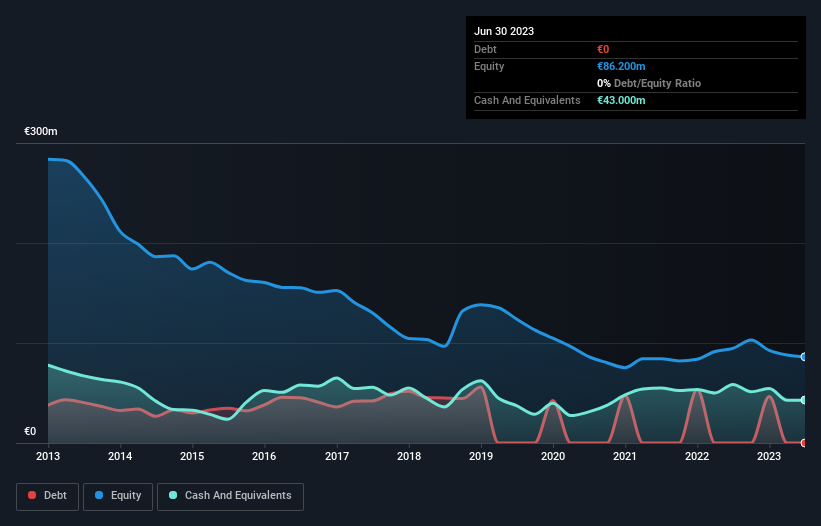Companies Like Natuzzi (NYSE:NTZ) Can Afford To Invest In Growth
There's no doubt that money can be made by owning shares of unprofitable businesses. For example, although software-as-a-service business Salesforce.com lost money for years while it grew recurring revenue, if you held shares since 2005, you'd have done very well indeed. But while history lauds those rare successes, those that fail are often forgotten; who remembers Pets.com?
So should Natuzzi (NYSE:NTZ) shareholders be worried about its cash burn? For the purposes of this article, cash burn is the annual rate at which an unprofitable company spends cash to fund its growth; its negative free cash flow. Let's start with an examination of the business' cash, relative to its cash burn.
Check out our latest analysis for Natuzzi
How Long Is Natuzzi's Cash Runway?
A company's cash runway is calculated by dividing its cash hoard by its cash burn. As at June 2023, Natuzzi had cash of €43m and no debt. Importantly, its cash burn was €2.4m over the trailing twelve months. So it had a very long cash runway of many years from June 2023. While this is only one measure of its cash burn situation, it certainly gives us the impression that holders have nothing to worry about. Depicted below, you can see how its cash holdings have changed over time.
Is Natuzzi's Revenue Growing?
We're hesitant to extrapolate on the recent trend to assess its cash burn, because Natuzzi actually had positive free cash flow last year, so operating revenue growth is probably our best bet to measure, right now. Regrettably, the company's operating revenue moved in the wrong direction over the last twelve months, declining by 11%. Of course, we've only taken a quick look at the stock's growth metrics, here. This graph of historic earnings and revenue shows how Natuzzi is building its business over time.
Can Natuzzi Raise More Cash Easily?
Since its revenue growth is moving in the wrong direction, Natuzzi shareholders may wish to think ahead to when the company may need to raise more cash. Issuing new shares, or taking on debt, are the most common ways for a listed company to raise more money for its business. Commonly, a business will sell new shares in itself to raise cash and drive growth. We can compare a company's cash burn to its market capitalisation to get a sense for how many new shares a company would have to issue to fund one year's operations.
Natuzzi's cash burn of €2.4m is about 3.2% of its €74m market capitalisation. Given that is a rather small percentage, it would probably be really easy for the company to fund another year's growth by issuing some new shares to investors, or even by taking out a loan.
Is Natuzzi's Cash Burn A Worry?
It may already be apparent to you that we're relatively comfortable with the way Natuzzi is burning through its cash. For example, we think its cash runway suggests that the company is on a good path. While its falling revenue wasn't great, the other factors mentioned in this article more than make up for weakness on that measure. Looking at all the measures in this article, together, we're not worried about its rate of cash burn; the company seems well on top of its medium-term spending needs. Separately, we looked at different risks affecting the company and spotted 2 warning signs for Natuzzi (of which 1 makes us a bit uncomfortable!) you should know about.
If you would prefer to check out another company with better fundamentals, then do not miss this free list of interesting companies, that have HIGH return on equity and low debt or this list of stocks which are all forecast to grow.
Have feedback on this article? Concerned about the content? Get in touch with us directly. Alternatively, email editorial-team (at) simplywallst.com.
This article by Simply Wall St is general in nature. We provide commentary based on historical data and analyst forecasts only using an unbiased methodology and our articles are not intended to be financial advice. It does not constitute a recommendation to buy or sell any stock, and does not take account of your objectives, or your financial situation. We aim to bring you long-term focused analysis driven by fundamental data. Note that our analysis may not factor in the latest price-sensitive company announcements or qualitative material. Simply Wall St has no position in any stocks mentioned.

